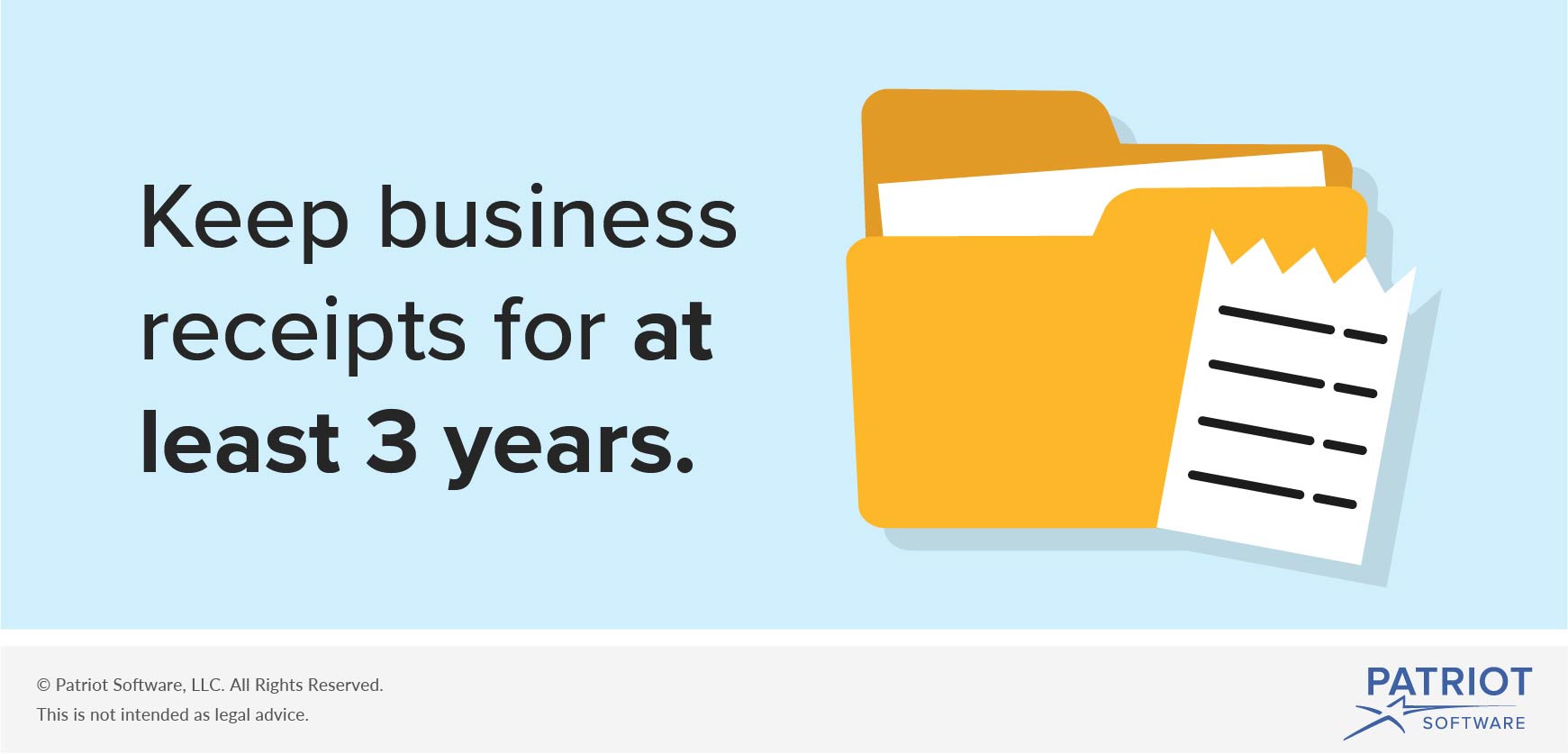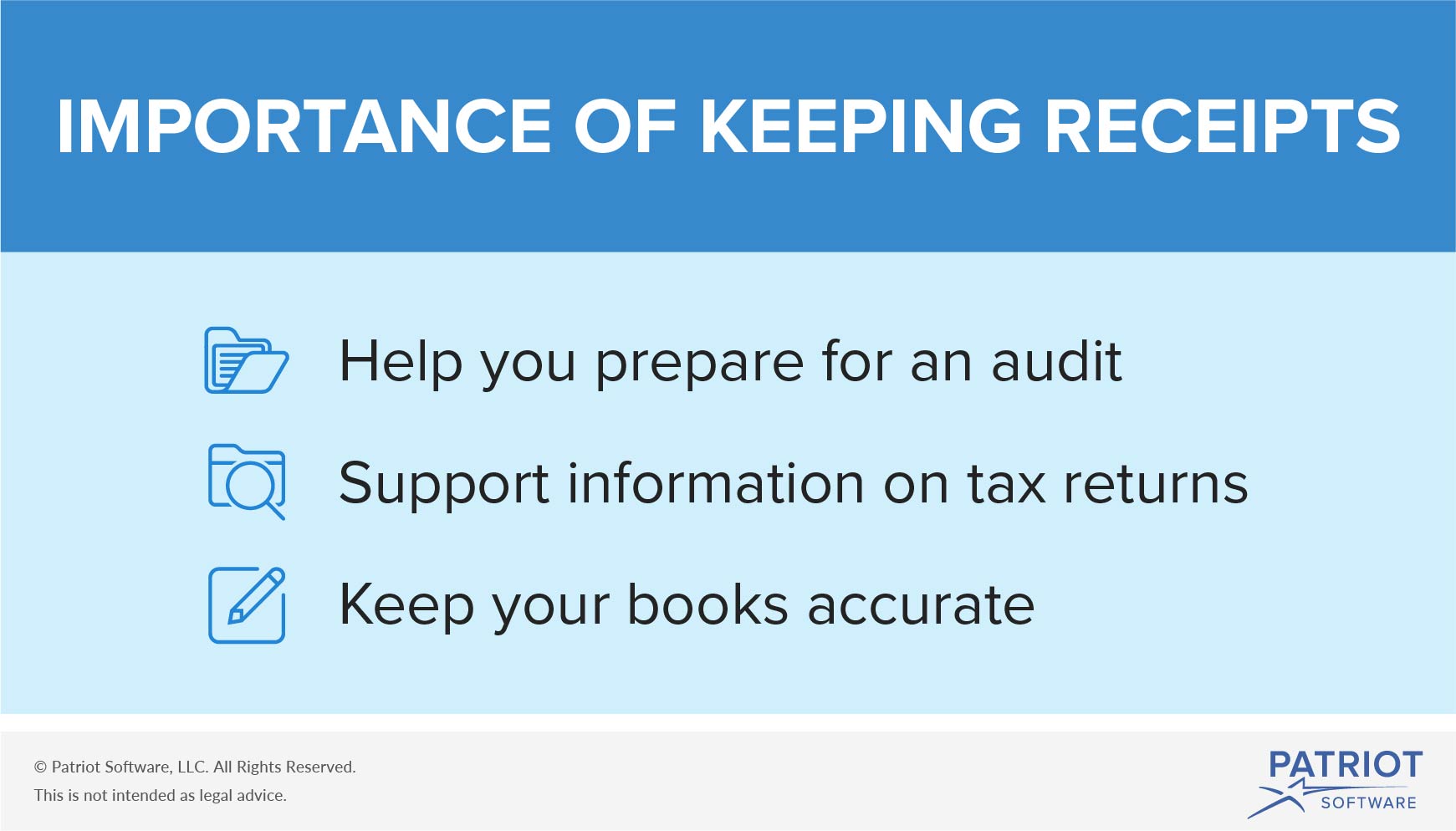If you find yourself tossing receipts left and right, you may want to think again. As a small business owner, keeping receipts is essential for your financial records. And not being able to locate a receipt can be problematic for your business. You need to know how long to keep business receipts to avoid complications with your accounting books in the future.
What are business receipts?
When a transaction occurs, you either give or take a receipt. Typically, receipts show the purchase date, item(s), and price of each item.
You provide receipts to customers after they buy something at your business. Likewise, you receive a receipt when you buy items for your business.
Receipts play an important role in your business. They provide customers with proof of purchase and ownership of the item. And, receipt information can help resolve customer issues (e.g., exchanges or returns).
You can also use business receipts for tax purposes. Receipts reinforce your transaction history in your accounting books. And, receipts support the information you list on your small business tax return.
How long to keep business receipts
How long should you keep business receipts? When it comes to keeping receipts, it’s better to be safe than sorry. Storing receipts for longer periods can benefit your business.
The general rule of thumb is to keep business receipts for as long as the IRS can audit your records. Usually, the IRS audits three years worth of records. Keep your business receipts for at least three years in case you need to show proof of purchases or sales.
In some cases, the government may look further back into your records. The IRS may audit six years worth of financial information for businesses suspected of fraud or tax underpayment.
Some other instances that might require you to hold onto receipts for a longer period include:
- If you omitted income from your return
- If you deducted the cost of bad debt or worthless securities
- If you don’t file a return
If you’re unsure about how long to keep a receipt, consult with an accountant to find out more information.
Exceptions
You might be wondering, Do I need to keep all business receipts? According to the IRS, you do not need to save every business receipt.
You do not need to save a receipt if one of the following applies:
- Your expense (other than lodging) is less than $75
- You have a transportation expense where a receipt isn’t readily available
For business expenses less than $75, you must still report expense details to the IRS. Provide the expense amount, date, location, and purpose of the expense.
Importance of keeping receipts
As a business owner, it’s easy to get behind on tracking and organizing paperwork. However, you must save business receipts to keep your accounting books up-to-date and consistent.
Even though it can seem tedious, keeping business receipts can benefit your small business. Business receipts can:
- Help you prepare for an audit
- Support information on tax returns
- Keep your books accurate
Receipts can help you prepare for an audit. Although there are different types of audit, many audits include a third party auditor reviewing your financial information (e.g., external audit).
During the audit, the auditor checks for inconsistencies on your small business tax return. Without receipts, it’s difficult to show the auditor that your information is correct. In case of an audit, keep records that back up your tax return information.
Business receipts can also help keep your books accurate. The fewer receipts you keep, the more likely your accounting books will be off. To keep your books correct, record receipts regularly. Add receipt information in your books as soon as possible for an accurate financial snapshot of your business.
Ways to store business receipts
There are a few ways to store your business receipts for safekeeping. You can organize business receipts using filing cabinets and folders. Or, you can opt to use a digital system or receipt scanner to store receipts.
If you store paper receipts, consider categorizing them by type (e.g., travel expenses) and chronological order for easy access. Use folders, cabinets, and labels to cut down on receipt clutter.
No laws require you to keep business receipts in paper form. Instead of storing paper receipts, consider using a digital method. You can invest in a receipt scanner to transfer receipts from paper to other devices, such as a computer or smartphone. You can also take photos of your receipts and store them on your devices.
Regardless of how you store business receipts, stay consistent with your method. That way, you aren’t scrambling to find a receipt when you need it.
Need help organizing your small business transactions? Patriot’s online accounting software is easy to use to track income and expenses. And, we offer free, U.S.-based support. What are you waiting for? Get started with your self-guided demo today!
This article has been updated from its original publication date of December 9, 2016.
This is not intended as legal advice; for more information, please click here.


